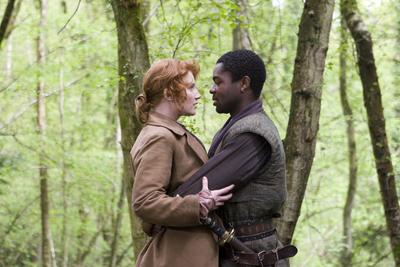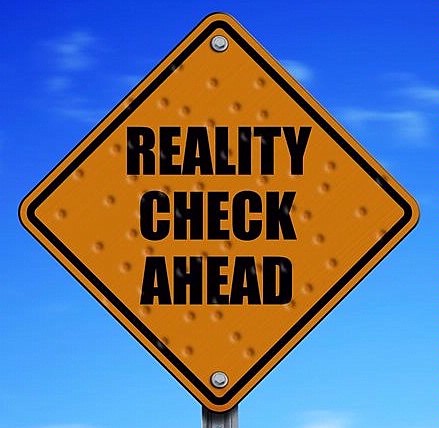I'm sorry I didn't get this posted before. My schedule is packed and insane this month and especially this week, and getting this posted just wasn't an option yesterday, but here it is, sans-pictures:
A. Learning Outcomes
1. How have I gained Shakespeare Literacy?
I think the sheer number of works we've read through this semester has helped me to gain better "literacy" of Shakespeare's works. Just like with learning a new language, you really have to immerse yourself into it and expose yourself to a lot of it before you get the hang of it. First comes the plot, then the characterization, and finally at some point you'll start to get all of the nitty-gritty jokes and cultural references woven into the text. I had been exposed to several of his works, in film and theater as well as in the text, before this class; but it's something that will always be improved upon with more practice.
Reading so many of his works also has helped me to see common themes, motifs, and messages coming through several of his works as a whole. Taking a look at the
gestalt so to speak might give us a little more insight into life of the man himself. For example, we talked about the commonalities between the couples of Perdita/Florizel and Ferdinand/Miranda, and I repeatedly mention (or, rant, rather, one of which you can see
here) my irritation at the "love at first sight" theme that seems to rear its ugly head in so many of his plays, including
The Tempest, Love's Labour's Lost, As You Like It, and
The Winter's Tale. Also mentioned in class was the common theme of Duke Banishment.
I've also gotten to know specific plays ( especially
As You Like It) more intimately in the specific themes and possible intentions of the writing during my personal reading process. Through searching external sources, reading Cassandra's blogs on the subject, and seeing several versions of it, I came to many conclusions that I had never seen or imagined in my experience with the same work before. I won't go into much detail on that, because I've already talked extensively on the subject in the blog posts about
homosexual themes,
analysis of film versions ,and my
final analysis.
I think as far as gaining literacy with performances, watching the
Winter's Tale in Cedar City really gave me some new insights as to how to sort of translate the text into action. The best example of this was the festival scenes with Autolycus. I know a lot of us read that play thinking . . .
what on earth is that character doing here? The "spectacle" of the festival scenes confused us, Autolycus' motives and purpose was unclear, and the whole 3/4 act seemed to be an enigma. But watching David Iver's play that character out. . . it was hard to describe, but suddenly Autolycus not only had a purpose in moving the plot forward, but he stole the show! There's much to be said there about his works being meant to be watched and not read.
Culture and new media is something I probably need to look into more. I've seen some modernized versions of plays, and sometimes played with reading "No Fear Shakespeare" (Where the original text is on the left side of the screen and modernized on the right) but I think that's something I could look into more for improvement of my understanding.
2. How have I analyzed Shakespeare critically?
Being trained as I am from a theatrical experience by a concept-Nazi of a Technical Director/Stage Craft Instructor, I find myself mostly blogging, discussing in class, and thinking about themes/concepts/motifs I see in the text. (The Grassroots Shakespeare company would surely disapprove, but its been hard wired into my head again and again.) But the way I figure it, if Shakespeare was the kind of artsy-fartsy literarary/theatrical geek he's made out to be, he'd probably be putting these things in there in the first place. After all, would you go through writing these long, elaborate plays and not include some kind of deeper meaning? I have a hard time imagining not. I did a lot of this in
As You Like It as mentioned above, but another example of this was when I was analyzing the concepts behind the set in the production we saw of
The Winter's Tale.
I also find myself very often asking (both to myself and in blog form)
Why did Shakespeare write this in relation to his life and his culture surrounding the time. I haven't had time to research more into these specific questions, but it often crosses my mind.
What I have done though is look at specific choices in productions I've seen, such as
Kenneth Branagh's As You Like It (set in 19th century feudal Japan) and the Cedar City
Winter's Tale, where I mentioned my theory that director Brian Vaughn chose the early 20th century setting because of its connection with women's rights movements.
3. How have I engaged Shakespeare creatively?
You know. . .there's probably instances of this the past semester but I just can't think of anything specific right now. This saddens me; creativity is what makes my world tick, so I'm not sure where I went wrong with this part.
4. How have I shared Shakespeare meaningfully?
Unfortunately as a Freshman with a maddeningly strict schedule, socializing has taken up a very small part of my time since my arrival here. . . and very little of it has involved Shakespeare (unless forcibly) outside of class. It's strange, because my friends back home are all theater junkies who all love Shakespeare. I guess even when I go visit them (to watch them perform various scenes of Shakespeare, no less) we're more interested in talking about the weeks of our lives we've missed out on in eachothers absence rather than Shakespeare itself. I guess its more of a binding and implicit understanding the binds us, rather than something explicit that we discuss openly. It was easier to have that sort of discussion last year, when we
did things together (like competing in the Shakespearean Festival) and, not having to catch up, could then discuss performances we'd seen.
I've found that talking with the other students in class has been more meaningful this semester than anything else. Just being able to talk to the other students about what they are seeing opens up my eyes to things I never saw in the text myself (Like Kelsie's comment on Prospero portraying himself as a Christ-like figure) and I think I've learned more from their comments then from anything else.
B. Self Directed Learning
- What have I done that demonstrates I have taken charge of my own learning about Shakespeare?
I think more than anything, taking a look at the way I mark up the text I'm reading shows how I'm taking a personal interest in learning more. I've got a picture I'll post later of a certain page in Hamlet that looks more like a coloring book than anything, but I think that actively engaging in what I'm reading, taking note of things I want to look into later, and researching things I don't understand has really been where I've taken charge in my own learning through this process.
- How am I doing at planning my learning, documenting my learning, finding appropriate resources for my learning, scheduling and carrying out learning activities, and measuring my learning?
Planning has been a little lacking admittedly, because my schedule is ever evolving I never know if I'm actually going to get to the reading I intended to that day. I don't have a problem with being consistent so much as I am on being on time. (I get behind once and I'm forever one step behind). I've found some resources that really have helped me along the way, like the yippy search engine for commonly used words/themes, the "no fear shakespeare" for passages I'm having trouble with, and reading other student's blogs on the same play especially have helped me. I find sometimes I will make discoveries in the reading I don't end up sharing in my blog, which is a bit detrimental as far as "documenting my learning." A lot of my blog posts are really long-winded, but I still don't feel like I always get to talk about everything I want to say (sometimes its also because some of the topics are disjointed from each other.
C. Collaborative and Social Learning
- Which students have aided me most in my own learning (through help inside or outside of class, through their comments on my blog, or through their blogging, etc.)?
It's pretty equally spread out, we have a pretty good group haha. I find that JJ's comments are most consistent and often prompt me with new questions about my topic. Kelsie's posts and comments are always unique and make me think about things I'd never thought about before. Anthony and Matt often build on what others have been talking about with examples. And Lauren always brings up very specific elements that open up a lot of broader discussion (like the boatswain post). I also learn a lot about ways to set up my blog in more cohesive ways from observing what others do (Kelsie taught me to put links to the other group member's blogs on my sidebar, and Matt uses a lot of subheading to break up the text. JJ links a lot of related and entertaining videos. I've tried to incorporate all of their best ideas in my blog as I see fit.)
- How is working withing the assigned learning groups working? How could this be improved?
As I mentioned before, having the discussion groups has really been helpful for me to understand the text, and talking with the small groups has taught me more than anything else we've done in this class. This fact surprised me, given the bad experiences in the past with group work. But I think the important difference is that it's not something where we're working to create something and one person is doing all the work while everyone else sits back; it's a discussion where everyone usually has something to say and contribute, and whatever they have to say really only adds to it. The only way I could think to improve it would be, as JJ mentioned, maybe to find some way to document the discussion so that the new ideas we come up with aren't lost.
- How am I involving others (outside of my group or even our class) in my learning? Or, how am I applying my learning about Shakespeare in social settings beyond class?
I think the first part of this question could pretty much be answered by my comments under "how have I shared Shakespeare meaningfully." As far as applying what I learn about Shakespeare outside of class, it's a bit difficult to pin down exactly seeing as I'm a theater major. I think most specifically is observing what directors have done in other productions and applying the lessons from it into my own experiences directing. For example, Kenneth Branagh and Brian Vaugn taught me to look beyond the boundaries of time and space, to find parallels in history and culture that relate to the story, and to use that as a basis for concepts in a show. Furthermore, they've showed me with that concept, I can break through the normal confines of a show (like traditional Elizabethan settings in a Shakespearean play) and toy with other ideas.
I'm doing that right now in the play I'm directing. "Dee and Dum" is a play written by a classmate, and its basically a creationism story of how Tweedle-Dee and Tweedle-Dum came to be (as punishment for hitting on and sort of mistreating women). It's one of many (there are tons, trust me) Alice in Wonderland spinoffs. I didn't want to make it like every other A.I.W spinoff out there, so I really looked through the text and came up with the concept of Karma as it relates to the Hindu religion . . .and long story short, this show now has a very heavy Indian/Hindu-mythological twist on it, which has given me a whole array of new ideas and possibilities to work with in this show.
D. Looking Ahead
I think first and foremost, I've gotten really excited about Shakespeare and want to continue reading his works after this class is over (especially Julius Caesar and Titus Andronicus). As far as the rest of class, I'd like to maybe get better about trying to keep up with reading and maybe push the whole "sharing outside of class" thing more in discussions with my friends (I plan to watch the 2010 version of The Tempest with them, so that should be a good opportunity). Also, I'm going to keep looking for new avenues to expand on "global sharing."
As far as prospective final projects, I'm still unsure. I wanted to join Averill's production but I've already sold my soul to two other theatrical productions, so a third is a total impossibility. What I would really like to stress at this point is that whatever I do IT REALLY NEEDS TO BE SOMETHING THAT CAN BE COMPLETED IN CLASS. My other classes all seem to think everything can and should be done outside of their class time, and even just the very basic required GE classes are having impossible conflicts with eachother.
One thing I have been thinking about is related to the movie I keep mentioning, Anonymous. Maybe we could possibly do some research on the man's life himself, go through point by point deciding if Roland Emmerich's theories have any substance behind them, and also decide if the identity of the author of these works is even important. I don't know, maybe? It's something to think about.






















